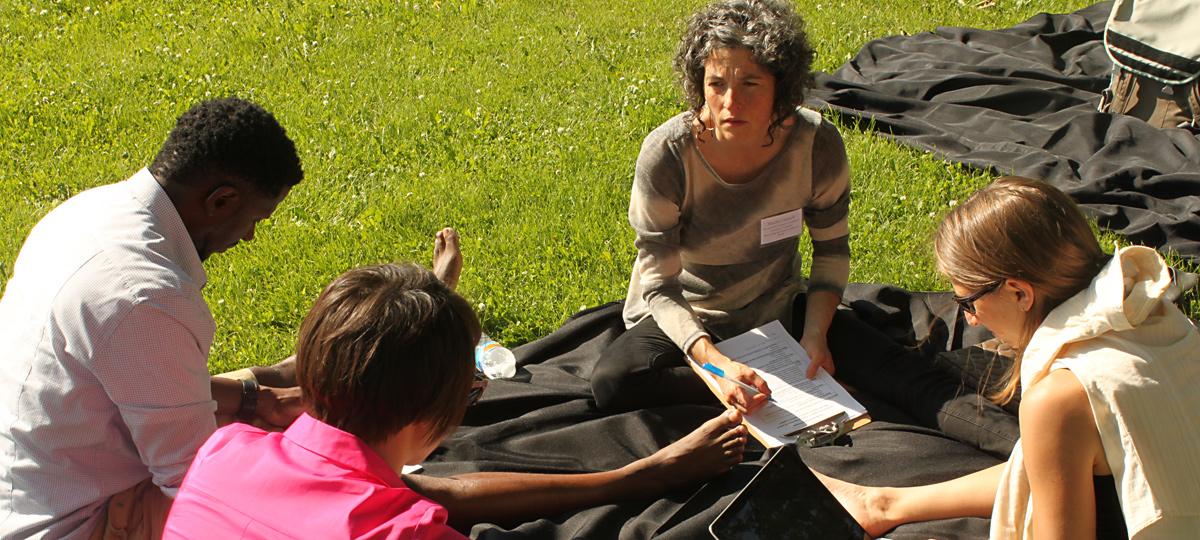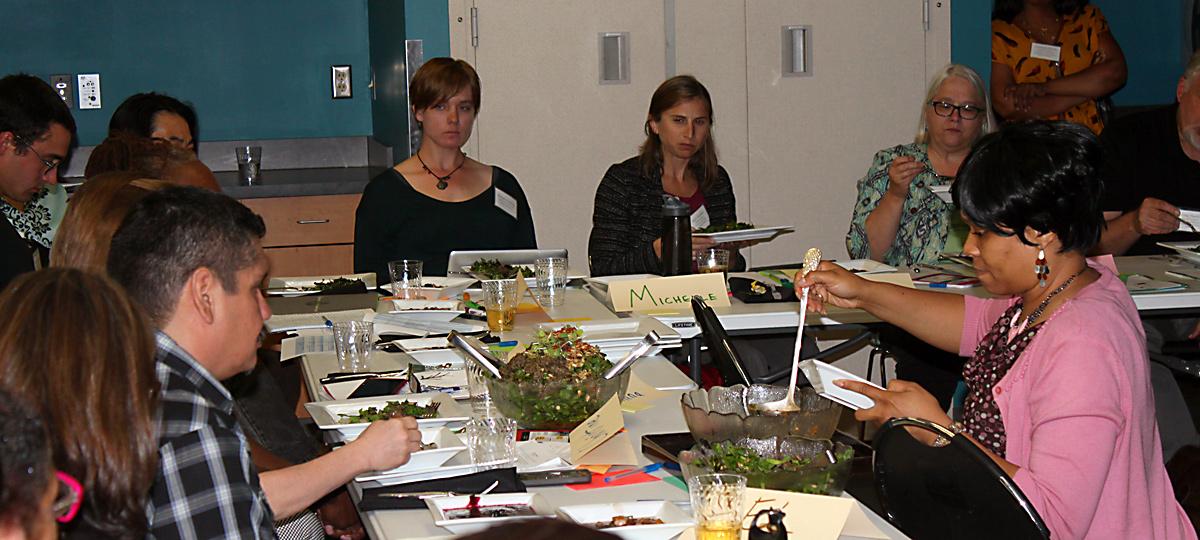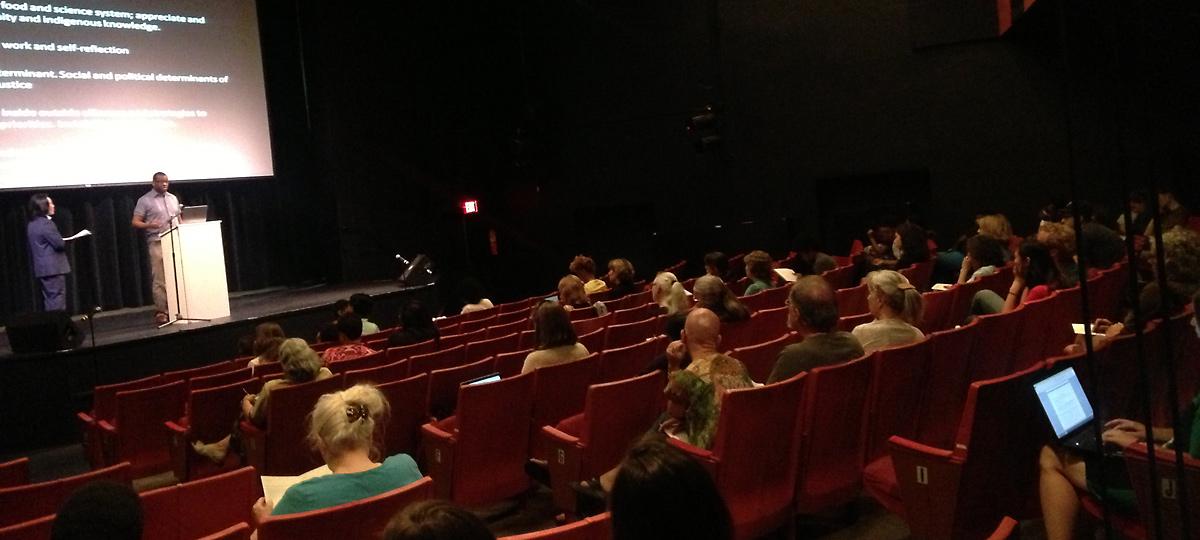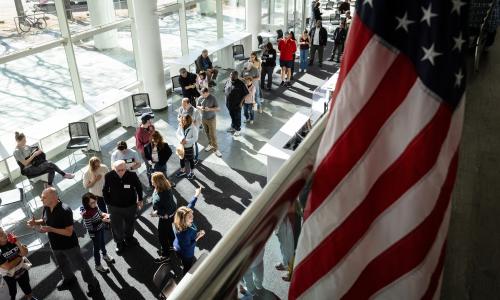In June 2015, the Food Justice, Science, and Democracy convening brought together community leaders, policymakers, researchers, and students to share ideas and experiences on what it takes to forge trusted, equitable, and respectful partnerships to advance food policy reform.
Several weeks ahead of the meeting, in conjunction with local partners in Minnesota, UCS deployed a community survey to understand what local residents consider their assets and challenges in securing healthy food for themselves and their families. The survey also gathered input on the kinds of local food policy reform residents would like to see in their communities, as well as their stance on partnering with researchers and scientists to achieve such change. See survey results >

Community partnerships
On June 4-5, more than 40 community leaders, researchers, students, and policy makers engaged in roundtable discussions, grounded in the context of systemic, institutional inequities and injustices in the food system. Highlights included:
- How to decolonize the food and science system and appreciate and recognize community and indigenous knowledge
- The ethics of food justice work and the need for deep self-reflection
- Science as one of multiple social and political determinants of health and food justice
- The need to develop inside/outside alliances and strategies to advance mutual priorities
Scientists and their community partners from across the country co-presented their models and food policy projects: what worked, what didn’t, and what they learned from their partnerships. Informed by these examples of community-researcher partnership, attendees discussed existing frameworks for respectful and trusted partnerships that value scientific and community knowledge and experience, as well as the challenges inherent in undertaking truly jointly-owned projects.
Presentations included:
Grounding in historical trauma and racial injustice and inequity
- Food as a Human Right: The Importance of Food Access in Promoting the Health and Well-Being of Urban Communities | video | slideshow
- Decolonizing Food, Consciousness, Culture and Community | video | slideshow
- Wenzikaamagak: From Our Roots: Food Sovereignty in Indigenous Life | video | slideshow
Models of Engagement: Researchers Working with Community Members and Policy Makers
- Food sovereignty and seed preservation | video
- Food dignity | video |
- The Farm Bill | video | slideshow
- Community gardens (Minnesota) | slideshow
- Community gardens (Wisconsin) | slideshow
- Farmer’s rights | video | slideshow
- The Minneapolis staple food ordinance | video | slideshow
- Native-owned grocery store | video | PDF

Lessons learned
The take-home message from the forum was that community-scientist partnerships can work, and have worked. Their success depends on many factors, including:
- openness and trustworthiness
- appreciation of mutual priorities, expectations, interests, and power dynamics
- a willingness to put assumptions aside and ask what people need
- due compensation to people who give of their time and knowledge
Researchers who work with communities were encouraged to adopt approaches that can make their work more effective:
- Recognize and honor cultural and historical context
- Meet people where they are—physically, mentally, and emotionally
- Be accountable—ensure that information and resources that your research generates go back to the community
- Build relationships and long-term engagement, show solidarity, and be present
Moving forward: future needs
Both scientists and community members need support in their collaborations—support from institutions, recognition from peer groups, and access to networks, hubs, and shared resources and learning opportunities.
Durable change will require continued courageous conversations between policy makers, communities, and scientists. And food equity work needs to be connected to a broader equity movement addressing the many issues that are interwoven with food justice, such as transportation, education, and employment.

Community forum: sharing
The June 6 community forum at the Capri Theater shared the MN food equity survey findings and highlights from the roundtable meeting on how local residents, researchers, public health officials, and policy makers are collaborating to address food environments in marginalized communities—in Minnesota and elsewhere.
A moving theatrical performance by community members, SOUL Food Monologues, enthralled and inspired the audience on the importance of healthy food and environment.
Download the video: Part 1 | Part 2 | Part 3 | Part 4 | Part 5
Advisory Committee
Participants in the June 4-5 community forum brought a wide range of perspectives to the discussion. They included tribal members, city officials, health professionals, community workers, farmers, and researchers in fields ranging from agroecology to kinesiology. We are grateful for their work with us, and we want to particularly recognize the members of the forum advisory committee for their guidance and many contributions:
- Dr. Tiffany Beckman, University of Minnesota
- Dr. M. Jahi Chappell, Institute for Agriculture and Trade Policy
- DeVon Nolen, West Broadway Farmers Market
- LaDonna Redmond, Campaign for Food Justice Now
- Simone Senogles, Indigenous Environmental Network
- Cassandra Silveira, University of Minnesota
- Monica Marie White, University of Wisconsin–Madison.
With thanks to Cecilia Martinez of the Center for Earth, Energy and Democracy.



